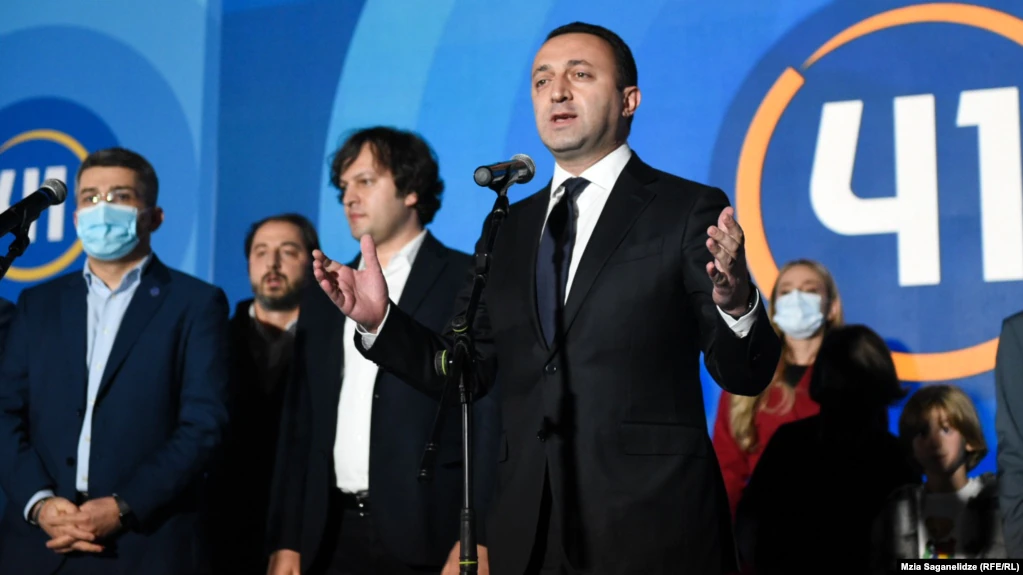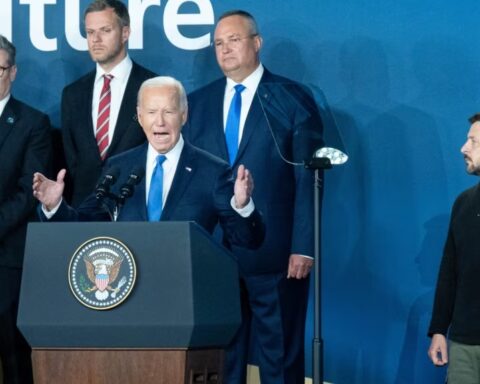TBILISI — Georgia’s ruling party has won the October 3 nationwide municipal elections that outside observers said were well-run but tainted by irregularities — a victory overshadowed by the arrest of returning former President Mikheil Saakashvili, whose supporters staged protests for his release on October 4.
The October 2 vote was held in a highly polarized atmosphere, with the results seen as a referendum on the Georgian Dream party’s rule and the prospect that a bad showing by the ruling party could prompt early parliamentary elections.
Georgian Dream passed the test, with results after all the votes were counted showing that it easily cleared the threshold to avoid an early parliamentary vote under a foreign-brokered agreement to end a long-brewing political crisis between the ruling party and the opposition.
After all results from the country’s 3,743 precincts were tallied, the ruling Georgian Dream party had 46.7 percent, according to the Central Election Commission (CEC) on October 4. The main opposition party, the United National Movement (ENM), had 30.7 percent. The rest of the vote was split among the remaining 48 parties, with the For Georgia party third at 7.8 percent.
The five major mayoral races held on election day — in Tbilisi, Batumi, Kutaisi, Poti, and Rustavi — will all head to runoffs after no candidate won an absolute majority, according to early results.
While the ruling party appeared to have scored a convincing victory, the opposition and outside observers alleged numerous irregularities while Saakashvili, the founder of ENM, vowed to continue a hunger strike he reportedly started after his arrest upon return from self-exile in Ukraine.
Waving Georgia’s red-and-white flags and chanting Saakashvili’s name, hundreds of demonstrators rallied on October 4 outside the prison in Rustavi, southeast of Tbilisi, where the former president has been held since his arrest after returning to the country last week.
Supporters vowed to stage mass protests in the coming days, as his lawyer, quoted by Russia’s state-run TASS news agency, said Saakashvili plans to keep up the hunger strike he declared on the evening of his arrest until he is freed.
The U.S. State Department said on October 4 that Washington was paying close attention to developments in Georgia and urged the government in Tbilisi to ensure Saakashvili is treated fairly.
“We’re following developments very closely,” spokesman Ned Price told a regular news briefing.
“We urge Georgian authorities to ensure that Mr. Saakashvili is afforded fair treatment in accordance with Georgian law, and Georgia’s international human rights commitments and obligations.”

Tensions were heightened by Saakashvili’s arrest within hours of his return from eight years in self-exile abroad on October 1. The 53-year-old Saakashvili, who was president from 2004-13, was sentenced in absentia to prison in 2018 for abuse of power and seeking to cover up evidence about the beating of an opposition member of parliament when he was president. Saakashvili has said the charges against him are politically motivated.
Prime Minister Irakli Garibashvili said on October 3 that Saakashvili would serve his full term of six years in prison before being allowed to return to Ukraine, where he briefly served as governor of the Odesa region, has held several top government positions, and currently heads the executive committee of Ukraine’s National Reform Council.
“As of today, he [Saakashvili] is sentenced to six years in prison,” he was quoted as telling Georgia’s Imedi television channel. “No one on the planet can convince us to release Saakashvili.”
Meanwhile, Ukrainian President Volodymr Zelenskiy said he would personally press for Saakashvili’s return.
“Mr. Saakashvili is a Ukrainian citizen,” Zelenskiy said at an event in the western Ukrainian town of Truskavets.
“We will use the level of all government institutions, including the [Ukrainian] Foreign Ministry, our ambassador to Georgia, and the Georgian ambassador to Ukraine. The governments, the prime ministers [of Ukraine and Georgia] — we all will be working on it (Saakashvili’s return to Ukraine).”
In its preliminary report of its observer mission’s findings, the OSCE/ODIHR said the local elections were “generally well-administered but held against the backdrop of a protracted political crisis and characterized by hardened polarization.”
The election watchdog noted that, while contestants were “able to campaign freely in a competitive environment,” the process was “marred by wide-spread and consistent allegations of intimidation, vote-buying, pressure on candidates and voters, and an unlevel playing field.”
The U.S. Embassy in Tbilisi echoed the assessment, congratulating the people of Georgia on the high voter turnout, but also describing the lack of focus on local issues as a “missed opportunity.”
“While voters were able to cast their votes in a largely calm environment on October 2, the election process is about more than Election Day,” the embassy wrote. “We share ODIHR’s concerns about the polarized media landscape, the significant imbalance of resources and insufficient oversight of campaign finances, the under-representation of women in the campaign, reports of misuse of administrative resources, and pressure against journalists.”
President Salome Zurabishvili, speaking to TASS on October 3, said the vote “took place in a calm, fair, safe, and competitive environment.”
“It is very important that today one more step toward democracy and stabilization was made,” she said.
The local elections come as the country has been in a protracted political crisis since Georgian Dream — founded by former prime minister and reclusive billionaire Bidzina Ivanishvili, who openly clashed with Saakashvili — won parliamentary elections a year ago.
Under an EU-brokered agreement reached in April to defuse the paralyzing political crisis between Georgian Dream and opposition parties, early parliamentary elections were to be called in 2022 if Georgian Dream received less than 43 percent overall nationwide in the local elections.

But in July, Georgian Dream leader Irakli Kobakhidze annulled the so-called April 19 agreement, blaming the opposition for its failure and claiming most other key provisions had been met.
At the time, Kobakhidze said that smaller opposition parties signed the agreement, but that the larger “radical opposition” blocs, including the ENM, refused to join the deal.
As the results came in, opposition leaders said there were widespread irregularities in the the October 2 vote despite Georgian Dream saying the elections had been held to the “highest democratic standards.”
The Interior Ministry announced on October 3 that it had launched 16 criminal investigations related to incidents that took place on voting day, including physical violence near or at polling stations.
Nongovernmental organizations monitoring the elections reported dozens of suspected cases of electoral fraud, including vote-buying, violations of the secrecy of the ballot, and “carousel voting” — where voters are bused into multiple polling stations as an organized group.
According to the Central Election Commission, 366 complaints were filed with the district election commissions on election day, most of them being “procedural deficiencies [that will] require disciplinary action against commission members.”
Transparency International, whose Georgia branch had about 300 observers on the ground, reported 160 violations, including multiple voting, the obstruction of monitoring, and the harassment of journalists. The violations led to the filing of 30 complaints, the corruption watchdog said.
Overall, voters cast ballots for mayors in 64 municipalities, as well as nearly 2,100 members of local self-governing councils. Voter turnout nationally stood at nearly 52 percent, according to election authorities.
In the mayoral election in the capital, Tbilisi, the incumbent, Kakha Kaladze of Georgian Dream, had nearly 45 percent of the vote, while ENM party chief Nika Melia was at 34 percent.






